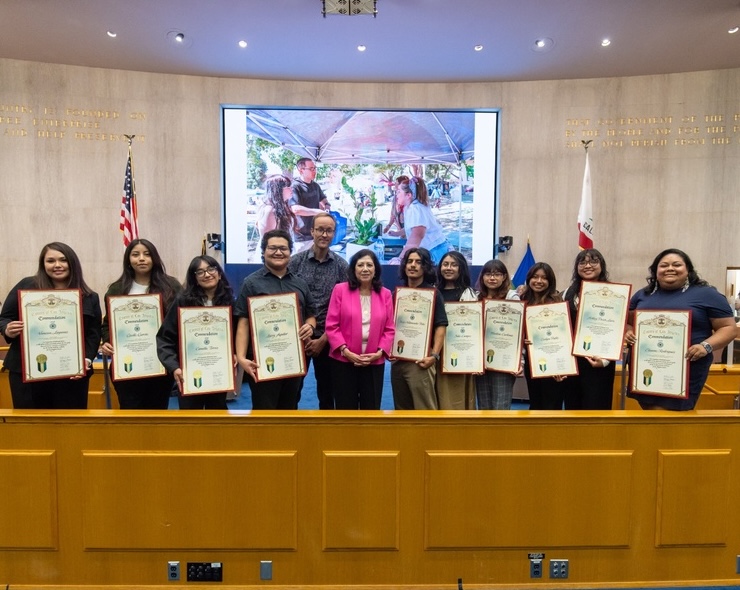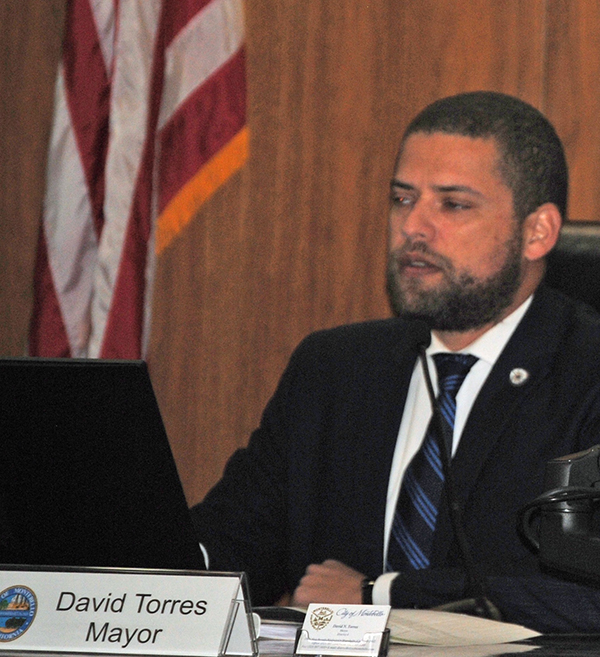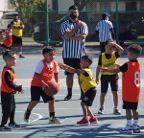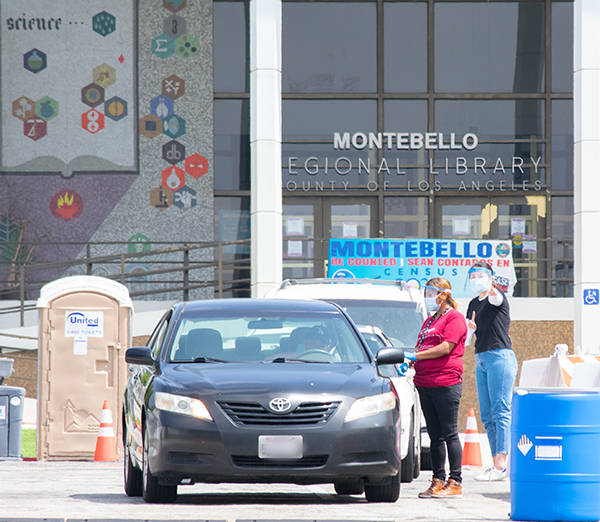Cal State L.A. students honored for boosting East Los Angeles small businesses

LOS ANGELES — The county Board of Supervisors has awarded Cal State Los Angeles students with scrolls in recognition of their advocacy work with small businesses, microbusinesses and nonprofits in underrepresented communities.
County Supervisor Hilda Solis presented the scrolls to nine current and graduated Cal State LA students during the board’s regular meeting at the Kenneth Hahn Hall of Administration last month. The students’ work with the university’s Los Angeles Economic Equity Accelerator and Fellowship (LEEAF) program has led to changes that have benefited small businesses serving the neighborhoods around the university.
“Today, we shine a spotlight not just on the achievements of these remarkable students, but also on the values of innovation, resilience and community impact that this program so powerfully embodies,” Solis said during the ceremony. “[This program] was created with the vision to build a future where opportunity is not reserved for the few but accessible to all by fostering diverse talent, equipping our students with real-world skills and empowering them to address systemic economic inequities.”
Solis presented scrolls to students Larry Aguilar, Julie Campos, Marlene Cardenas, Giselle Garcia, Vanessa Lagunas, Evelyn Pablo, Ashley Pazos Lara, Camilla Torres, and Jorge Valenzuela-Felix, as well as LEEAF Director Elianne Rodriguez and lead faculty member Dmitri Seals.
“In recognition,” the scrolls read, “of dedicated service to the affairs of the community and for the civic pride demonstrated by numerous contributions for the benefit of all residents of Los Angeles County.”
Since 2022, about 300 students representing LEEAF have visited 13,000 area businesses and connected with more than 2,000 of them in an effort to better understand their needs. The findings from face-to-face interactions with the small business owners were documented in reports that led to policy shifts enacted by the Board of Supervisors and LEEAF partners such as the county Department of Economic Opportunity.
The first report, “Listening to the Businesses of East LA,” was published in late 2022. It was followed earlier this year by “Rebuilding Trust.”
“The data tells us that 70% of these businesses have never heard of the resources available to them,” Rodriguez said. “There is money available to support their businesses, but they don’t know about it. This is why outreach work is so special. The door-to-door canvassing and support that we provide small businesses afterward is really important.”
LEEAF endeavors to foster economic leaders, especially women of color, to expand for-profit, social impact, and other organizations in the county through intensive trainings and one-on-one advising. Participants partner with students and recent graduates trained in entrepreneurship to develop business models that are disaster-resilient and able to overcome economic downturns.
The program started in 2021 as Los Angeles was recovering from COVID-19. Solis, worried by the unseen challenges that the pandemic might have brought to East L.A.’s small businesses, approached Cal State L.A. to conduct a study.
“There was a lot of concern that there were impacts that the county had not accounted for,” Seals said. “So, they contracted with us, just to see if there were any gaps in their data.”
Some of the gaps were enormous. For example, the county provided the university with a list of small businesses in East L.A., but the student researchers’ follow-up with the community revealed that only 10% of the businesses were still operating at the addresses logged on the list.
The research also found that some of the businesses did not have the proper permits, while others with correct documentation were improperly sharing space with unregistered businesses.
“What’s important is that we were visiting from a place of curiosity and data collection, not from a punitive perspective,” Rodriguez said. “We’re not there to enforce code or licensing. We were there to learn.”
The approach gained the trust of the business owners, and the researchers discovered some of the merchants’ biggest concerns included navigating complicated permitting processes and overcoming the Spanish-English language barrier while dealing with the county.
Rodriguez said the Board of Supervisors responded to Cal State L.A.’s findings by providing grants and technical assistance to the businesses. The board funded LEEAF’s Entrepreneurial Academy and Strike Team, which assists small business owners in growing their businesses.
Last year, LEEAF received two major grants to support its programs. The county’s Department of Economic Opportunity Economic Mobility Initiative provided $2 million, and the city of Los Angeles’ LA Optimized 2.0 program gave $1.2 million.
LEEAF benefits the student researchers as much as the businesses.
“A lot of them are from the area, a lot of them come from sociology,” Seals said. “They have a hunger for community-based work that really feels like they’re using their degree to benefit the community. That hunger hasn’t always been actualized in the college experience. There is this desire to get out in the streets and talk to real people and elevate and amplify their voices.”
Vanessa Lagunas, who completed her bachelor of arts in sociology in 2023, now applies the soft skills she picked up from LEEAF in her role as a program assistant with the Pacific Coast Regional Small Business Development Center, where she continues to interface with business owners.
Lagunas, 36, said she initially balked at the idea of participating in LEEAF because she lacked confidence in her communication skills. At the urging of Seals — one of her sociology instructors — and Rodriguez, Lagunas relented and signed up for the program. She went on to thrive with LEEAF.
“This program really changed my life,” Lagunas said. “There are not a lot of programs like LEEAF in our school. I learned a lot of skills that you just can’t pick up in the classroom.”





